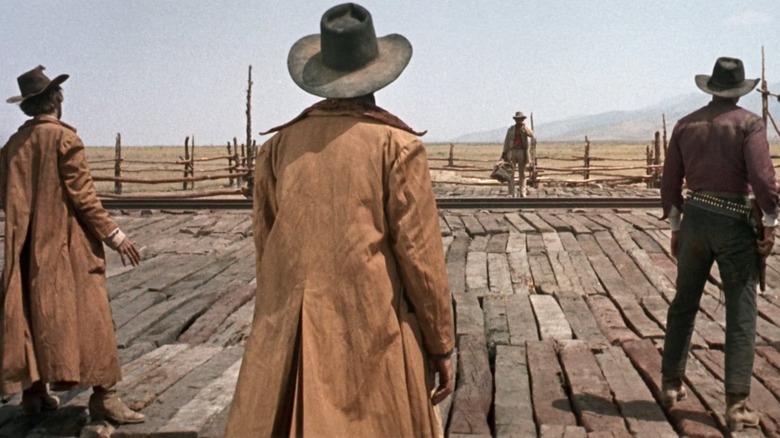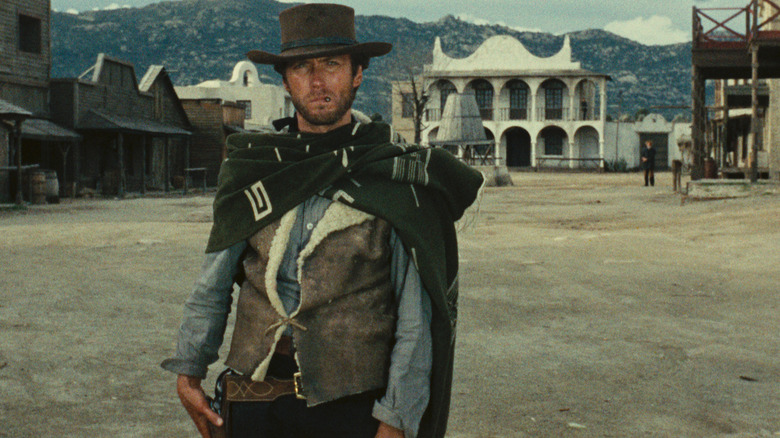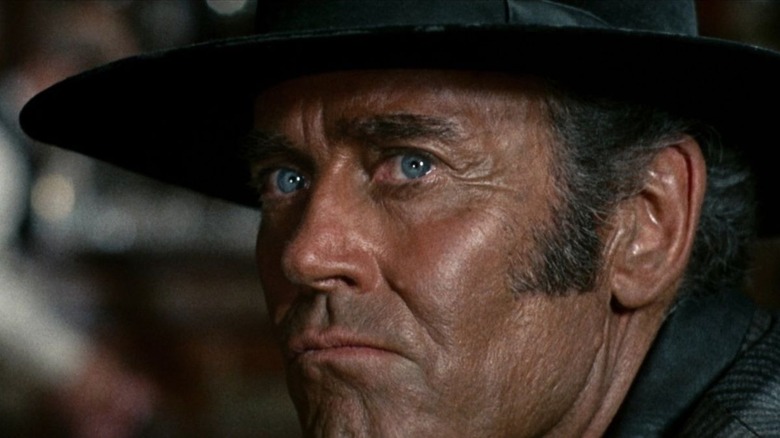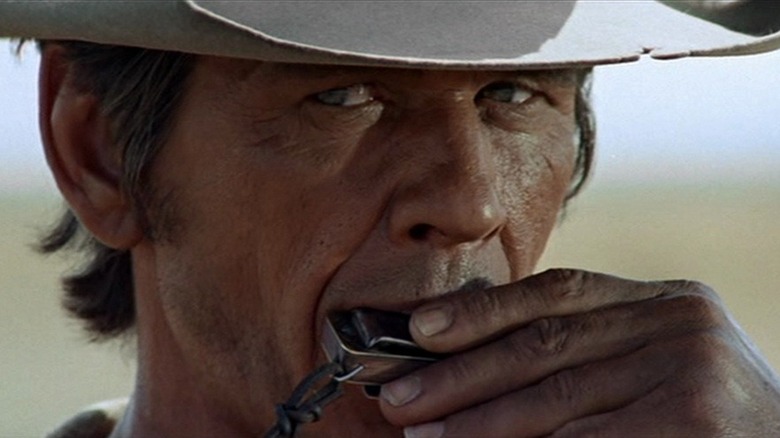Pitching Once Upon A Time In The West To Clint Eastwood Didn't Go Well For Sergio Leone
We may receive a commission on purchases made from links.
"Once Upon a Time in the West" has one of the greatest opening sequences I've ever seen. Three sinister outlaws descend on a train station in the middle of nowhere, lock up the station master, then wait a wordless eternity for the next train to arrive. For the next eight minutes, we watch them kill time; in Sergio Leone's hands, the tedium is riveting. One gunslinger sits by a water trough, cracking his knuckles. Another tries catching 40 winks but finds himself harassed by a persistent fly. The third stands under the water tower, catching drips in the brim of his hat. In the background is the singsong whine of a creaky windmill.
In a sudden burst of smoke and noise, the train gallops down the track. Pulling in at the station, it seems their target isn't onboard. Then a haunting harmonica melody rings out as the train pulls away, and there, on the other side of the track, is Harmonica (Charles Bronson). He finishes his tune, in no hurry. Noticing three horses tied up, he asks if they brought one for him. The men smirk. "Looks like we're shy one horse," one says. Harmonica shakes his head slowly. "You brought two too many." A breathless moment passes, then Harmonica shoots all three dead.
The sequence is a distillation of all the elaborate showdowns Leone orchestrated in his "Dollars Trilogy" — the desolate sunbaked location, terse dialog, mega close-ups of hard-worn faces, the moments of quirky humor, and the director's ability to stretch a critical moment out for a lifetime before releasing the tension in a sudden flurry of violence.
This masterful overture sets the tone for Leone's epic tale of greed and revenge in the Old West, but the scene managed to turn the director's biggest star — Clint Eastwood — off the part of Harmonica.
Clint Eastwood's rise to stardom
Perhaps more than anyone else, Clint Eastwood owes his stardom to Sergio Leone. He struggled to find significant film roles in the '50s before landing a role in the TV western "Rawhide." The show made him known, but he was still a long way from the superstar he would eventually become.
After "Rawhide" was canceled, Eastwood was offered the role of protagonist in Leone's "A Fistful of Dollars." He jumped at the opportunity. He said:
"I did get awfully tired of playing the conventional white hat... the hero who kisses old ladies and dogs and was kind to everybody. I decided it was time to be an anti-hero."
Eastwood's instincts were correct, and he slipped right into the role of the laconic stranger with a deadly draw. Now in his 30s, his face was more weathered, lined, and lived-in, a captivating face that looked great in Leone's massive close-up. Eastwood also insisted on removing lines from the screenplay to make the character more enigmatic, saying everything with his steely gaze and trademark squint.
"Fistful" became a major hit and catapulted Eastwood to international fame. He played variations on his "Man With No Name" persona in "For a Few Dollars More" and "The Good, the Bad, and the Ugly," further cementing his iconic western status.
After the success of the three films, Leone wanted to move away from westerns and adapt "The Hoods" by Harry Grey, a project that would eventually become "Once Upon a Time in America." Nevertheless, Paramount tempted him with a hefty budget and the prospect of working with Henry Fonda, Leone's favorite actor. He agreed and "Once Upon a Time in the West" was the outcome. Once again, he turned to Eastwood for the role of vengeful Harmonica.
Why Clint Eastwood rejected Once Upon a Time in the West
After the outstanding success of their previous collaborations, you might think it would be a no-brainer for Eastwood to sign on to another project with the director. That was not the case, however, and Leone's pitch did not go down well with the actor. The first sticking point was the opening sequence, which Leone explained in elaborate detail. Eastwood was particularly baffled by the outlaw catching the annoying fly in the barrel of his gun. According to Eastwood's biography:
"'It took [Leone] fifteen minutes to get past that part,' [Eastwood] says, and he remembers asking, 'Wait a second, where are we heading with this?' But Leone was not to be hurried, and continued his synopsis at his own overly detailed pace."
While Eastwood eventually understood the artistic scope of "Once Upon a Time in the West," he still saw it as "just another pasta dish." He also realized that he would still be the poncho and the squint to the film's more colorful characters, roles eventually filled by Henry Fonda and Jason Robards.
He was right in some respects. The most memorable character in the film is the villain of the piece, Frank, played devastatingly against type by Fonda. Leone knew the power of using the actor's famous blue eyes, usually deployed in kind or noble roles, for an avaricious killer with no qualms about gunning down a little kid.
Eastwood turned Leone down and the part went to Charles Bronson, who originally passed on the lead in "Fistful." He had made a big impression with a series of striking supporting characters in "The Magnificent Seven," "The Great Escape," and "The Dirty Dozen," and the monosyllabic actor brought a different approach to the deadly stranger role.
How Once Upon a Time in the West turned out with Charles Bronson
Charles Bronson was an actor whose hard-as-nails upbringing in a roughneck mining town informed his tough-guy persona, and he played Harmonica far differently than I imagine Eastwood would. While the Man with No Name was aloof and quick on the draw, Eastwood also gave the character a sense of ironic, deadpan detachment. There was often gallows humor in the way he delivered his lines; just consider "My mule don't like people laughing," or "Get three coffins ready" and its sardonic punchline in "A Fistful of Dollars."
Bronson, on the other hand, plays Harmonica as more elemental. Perhaps because he was used to supporting roles rather than the lead, he seems fully content playing an enigmatic force of nature compared to Fonda and Robards' more earthly characters. When he appears on the station platform in that long opening sequence, it's as if he was carried in by the wind rather than the locomotive. The mournful notes from his harmonica seem to arrive before he does, a harbinger of the quick death he is about to deliver to his enemies. It would have been different with Eastwood in the same role, standing there silent, monolithic, as if he'd been there all along.
Just imagine the line, "You brought two too many" coming from Eastwood; it would have just been another wry kiss-off line. When Bronson delivers it, there is no trace of humor. It's a genuine threat that sucks the air out of the scene as the three outlaws, suddenly realizing the danger, enter their showdown stances. That shift in tone sets the stage for the rest of the film, which is far more somber than the up-tempo "Dollars Trilogy." Sometimes losing out on your big star is a blessing in disguise.



